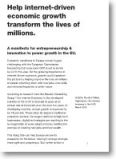We recently featured the Ignite Social Enterprise initiative, the Big Energy Idea, which will put over £10 million pounds into the ‘social energy’ sector in the next ten years.
See our original article here.
Below is a short film of the recent Ignite ceremony, where ten passionate and technically informed social businesses won funding and support as the first tranche of winners in the Big Energy Idea.
At the inaugural event held at Centrica’s head offices on 29 and 30 April 2014, the successful Big Energy Ideas were selected. The 10 entrepreneurs will now work with an expert team from the energy sector to raise investment in their ventures in order to grow their companies and scale the social impact of their work.
You can discover more about the winners, and their enterprising ‘social energy’ ideas below…
Brackenburn Ltd is an ethical business established to produce biomass fuels derived from local sustainable resources, primarily bracken,
and to market to domestic customers and public sector, agricultural and commercial users within the region. ![]() Read more here…
Read more here…
Energy Box: Based in Soho, Energy Box will deliver a £100 per year cost of energy reduction per household in fuel poverty while employing people from the same communities to manage and maintain the system.
Co-Wheels: Based in North East, UK wide, Co-Wheels is the first registered social enterprise that focuses on making personal mobility accessible for lower income communities while reducing car use. ![]() Read more here…
Read more here…
Energise London: In four of London’s 33 boroughs, Energise London operate free energy savings advice helplines and train employees to recognise and address fuel poverty. ![]() Read more here…
Read more here…
Energy Solutions Malvern: Based in West Midlands, Energy Solutions Malvern provide renewable energy installations to customers who enjoy return on investments and environmental benefits from a reduction in their carbon footprint. ![]() Read more here…
Read more here…
Gower Power: Based in Wales, Gower Power will build solar farms, providing green electricity for households and a local school. Using the
Feed In Tariff income they will grow affordable, local produced food on the farm owned as part of the Co-op structure. ![]() Read more here…
Read more here…
GrowUp Urban Farms: Based in London, GrowUp Urban Farms will create urban farms that use sustainable technology to grow food for local communities that lack open spaces in a way that is energy efficient. ![]() Read more here…
Read more here…
Health Squared: Based in North Yorkshire, Health Squared sell wood briquettes as a commercial venture for public good. Working with local health partners, their public
good is providing renewable energy to all customers and free briquettes to targeted older peopel to keep them warm. ![]() Read more here…
Read more here…
Rekindling: Based in London, Rekindling will support the rehabilitation of offenders by making what would otherwise have been waste wood into bags of firewood and kindling which will be sold commercially.
Sust-It: Based in the South West, Sust-It is a customer focused energy use comparison and
advice website that assists low income individuals and improve energy literacy. ![]() Read more here…
Read more here…
It is great to see the vibrancy and enterprise in this newly emergent sector. The project winners are innovative organisations with a social mission, whose work provides change and efficiency both up and down the supply chain.
We wish them well and look forward to the next cohort of Big Energy Idea winners.
Winner narratives for this article courtesy of Ignite







